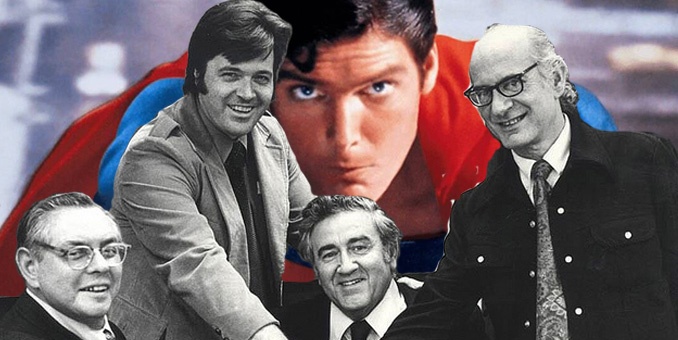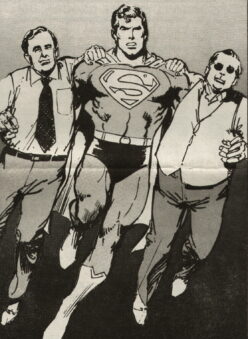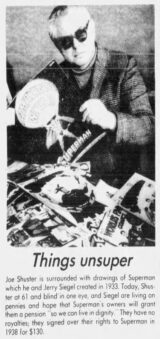
I, Jerry Siegel, the co-originator of Superman, put a curse on the Superman movie! I hope it super-bombs. I hope loyal Superman fans stay away from it in droves. I hope the whole world, becoming aware of the stench that surrounds Superman, will avoid the movie like a plague.
That was the opening salvo of a press release written by Jerry Siegel in October of 1975. At the time, Siegel was working as a clerk-typist for the state of California, making $7,000 a year, which he was using to support himself, his wife and his daughter. Joe Shuster was blind in one eye and unemployed living with his brother in Forest Hills, NY. Both men’s health were failing and both were facing their golden years being full of poverty and want.
Siegel and Shuster tried going through the courts twice before to get fair restitution for creating Superman. In 1947, the pair sued for back royalties and the rights for Superman and Superboy. They pair settled out of court with DC for $64, 000–over $1.1 million in today’s money–with the characters being transferred to DC Comics. However, DC fired both Siegel and Shuster from the books as a result of their suit.
When the copyright for Superman came up for renewal in 1965, the pair filed their renewal of the character’s copyright. DC Comics filed as well. After DC kept publishing Superman titles, Siegel and Shuster filed suit in 1969 for the Superman rights.
 They lost the first case and the appeal, but were intending to appeal the case all the way to the Supreme Court when their lawyer in April 1975 said that DC would be willing to make them a pension offer if they didn’t pursue the suit any farther. Siegel and Shuster agreed and held off on the suit. When six months passed with no movement on a pension from DC, Siegel got angry and the press release was born.
They lost the first case and the appeal, but were intending to appeal the case all the way to the Supreme Court when their lawyer in April 1975 said that DC would be willing to make them a pension offer if they didn’t pursue the suit any farther. Siegel and Shuster agreed and held off on the suit. When six months passed with no movement on a pension from DC, Siegel got angry and the press release was born.
Daniel Best, owner of the website I linked to above, lists the press release in its entirety, along with any letters and documents listed within. In it, Siegel paints himself as naive young man who was manipulated by Jack S. Liebowitz, co-owner of DC Comics, who promised to take care of Siegel and Shuster when it came finances, instead cheat them out of what they were due.
Siegel sent out hundreds of copies of that press release to just about every media outlet in the country. Only one journalist replied–Phil Yeh of a monthly Long Beach California arts newspaper call The Cobblestone. But that led top a TV interview which was seen by Jerry Robinson. Robinson was one of Bob Kane‘s ghost artists who had moved on to become a noteworthy illustrator and editorial cartoonist. Robinson decided to use his influence to help the story reach a larger audience.
The first article I could find on Newspapers.com about Siegel and Shuster’s situation appeared in a syndicated article from the Chicago Sun-Times service written by Bob Greene. The story appeared on the front pages of papers like The Miami News and the Des Moines Register starting on 11/10/1975. This started a cascading series of articles of different journalists covering the story from different syndicates. When one story started faded out, another syndicate’s story would fill in the gap.
 Following Bob Greene was an article by Mary Breasted from the New York Times News Service, which started appearing in paper around November 23, 1975 and an article by Victoria Graham from the Associated Press that started appearing in papers the same day. Then came the New York Newsday article of December 10, 1975.
Following Bob Greene was an article by Mary Breasted from the New York Times News Service, which started appearing in paper around November 23, 1975 and an article by Victoria Graham from the Associated Press that started appearing in papers the same day. Then came the New York Newsday article of December 10, 1975.
 Greene and Graham talked to Jay Emmett, then an executive vice-president at Warner Brothers, DC Comics parent company. To Greene, Emmett said that while he had no legal obligation to Siegel or Shuster, out of “morality and compassion” Warners would be offering some kind of pension to the pair. However, to Graham, Emmett made sure to add that Siegel and Shuster made “hundreds of thousands of dollars” over their years at DC. Nothing contradicts the generosity of Emmett’s offer than him hinting that if Siegel and Shuster are destitute, it’s their fault.
Greene and Graham talked to Jay Emmett, then an executive vice-president at Warner Brothers, DC Comics parent company. To Greene, Emmett said that while he had no legal obligation to Siegel or Shuster, out of “morality and compassion” Warners would be offering some kind of pension to the pair. However, to Graham, Emmett made sure to add that Siegel and Shuster made “hundreds of thousands of dollars” over their years at DC. Nothing contradicts the generosity of Emmett’s offer than him hinting that if Siegel and Shuster are destitute, it’s their fault.
Then comes the Newsday article. Newsday writer Thomas Collins spoke not with Emmett but with Liebowitz. And Liebowitz was pissed. While he did say that he would give Siegel and Shuster money for “humanitarian reasons,” he wouldn’t be happy about it. These are some of his quotes from the article:
- “They have no legal rights. All the press conferences and TV shows can’t get you anything that isn’t yours.”
- “Everybody gets humanistic about this. But it is being distorted. When you work for the phone company and they make zillions from you invention, do you think you are entitled to a piece of those zillions? You work for a salary. So–they got a salary.”
- “When you sell something, you just can’t get it back.”
- “We made Superman valuable through our efforts and abilities. Aren’t you supposed to profit from your business and the money you put into it?”
All those comments would be off-putting on their own. Coming in an article where Siegel admits to thinking about suicide and Shuster states that Liebowitz made him quit a job as a messenger because he was giving DC a bad name whenever he came to the office to deliver messages makes Liebowitz’s words especially unctuous.
The powers that be at Warners were probably seeing the tide of public opinion turn, because articles reporting the company offering them a $15,000 yearly pension started hitting papers. Siegel and Shuster were holding out for $20,000-$25,000 range–the amount most current comic book creators were making in a year.
As negotiations went on, the media blitz continued. An article by Ira Berkow started to appear in newspapers. And Siegel and Shuster were scheduled to do an interview on the December 15, 1975 edition of The Today Show.
The endless barrage of articles portraying Siegel and Shuster as sickly paupers and DC Comics as evil swindlers eventually became to much to bear for Warners. On December 23, 1975, the corporation made an agreement with Siegel and Shuster. In it, they agreed to the following terms.
- DC would acknowledge Siegel and Shuster as the creators of Superman.
- Siegel and Shuster would acknowledge DC Comics as the owners of Superman.
- The decision of Siegel and Shuster to not appeal their court ruling was not influenced by anything DC did or promised.
- Both sides would acknowledge that DC is not obligated to pay Siegel and Shuster anything.
- However, DC agrees to voluntarily pay Siegel and Shuster
- $20,000 a year before taxes starting on January 1, 1976.
- Jerry Siegel’s pension would go to his wife Joanne if he died. If he died before December 31,1985, Joanne would get the full $20,000 until that date, then $10,000 a year from that point until her own death. If both died before December 31,1985, then daughter Laura would get $20,000 until that date and then it would stop.
- Frank Shuster (Joe’s Brother) would get a $10,000 if Joe died before December 31, 1985 and then get a $5,000 yearly pension from that point until his own death.
- Both men would be included on Warners’ insured medical plan.
- Both men would get $7,500 for legal fees, with the caveat that DC was not obligated to pay these fees.
- They would get $10,000 each to pay off their debts.
- They would receive a “created by” credit on any DC Comic book that featured Superman as a primary character.
- DC would try to get them a creator credit on the then forthcoming Superman (They succeeded in that).
- Credit (but no royalties) on any Superman TV and Movie project from that point on.
- No credit on merchandise.
- The agreement applied to future owners of DC Comics in case they were sold.
In addition, both men got a one-time $15,000 bonus after the success of Superman and their yearly stipend was increased to $30,000 a year in 1981.
Even though their heirs would sue DC over Superman after both of them had died, Siegel and Shuster’s publicity blitz worked out well for them financially during their life time, arguably better than their legal battles had done and at a lower price. But in the process, they set the precedent for how creator would deal with financial issues for decades to come: become the squeaky wheel.
Next Time: We look at a Marvel creator how successfully struck out to do creator owned work–18 years before Image did it.




